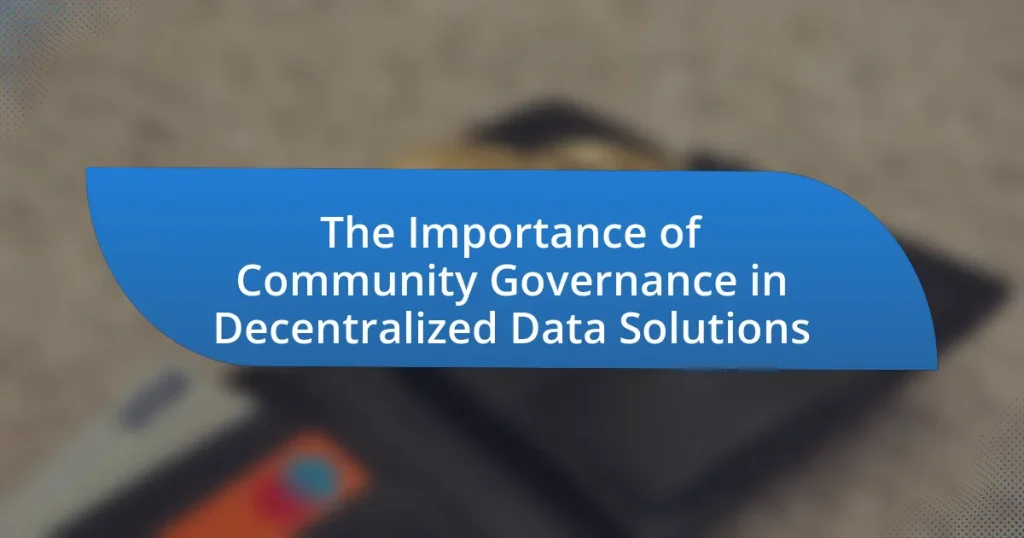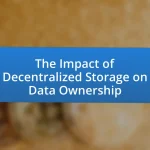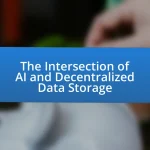Community governance in decentralized data solutions is a collaborative decision-making model that empowers users to collectively manage and control data. This governance approach enhances transparency, accountability, and trust among stakeholders, contrasting with traditional top-down governance models. Key principles include inclusivity, transparency, accountability, and collaboration, which are essential for effective governance. The article explores the functioning of community governance, its significance for data security, challenges faced, and best practices for implementation, emphasizing the importance of active participation and clear communication in fostering resilient decentralized systems.
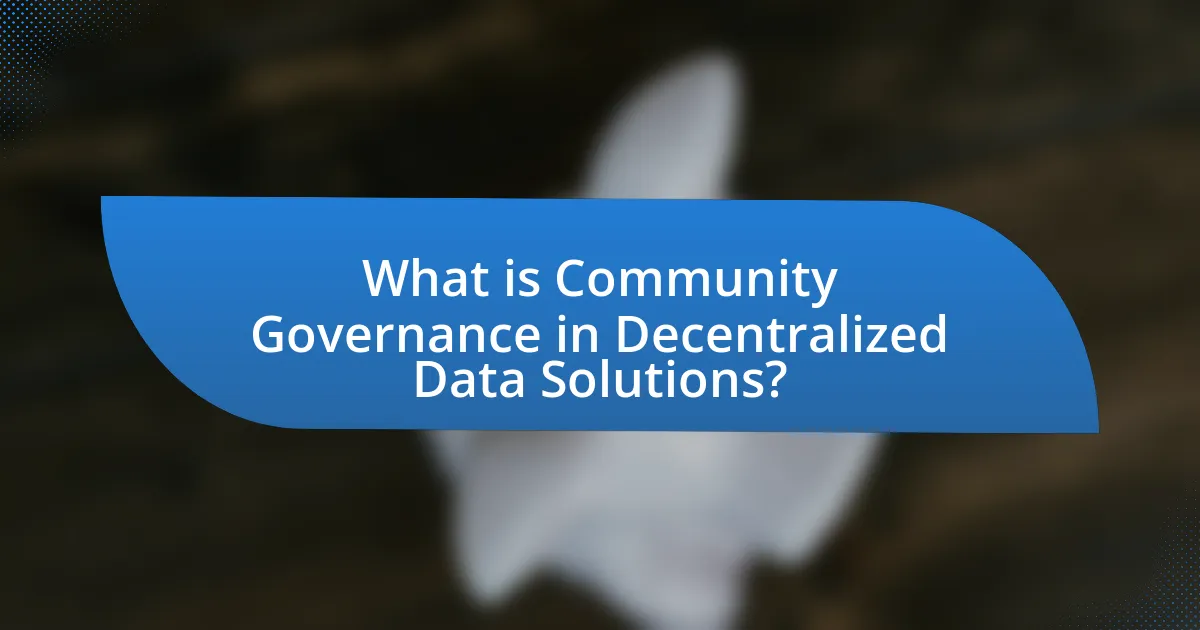
What is Community Governance in Decentralized Data Solutions?
Community governance in decentralized data solutions refers to the collaborative decision-making processes that empower users to manage and control data collectively. This governance model enables stakeholders to participate in shaping policies, protocols, and the overall direction of the data ecosystem, ensuring that it aligns with community values and needs. Evidence of its effectiveness can be seen in decentralized autonomous organizations (DAOs), where community members vote on proposals, demonstrating a shift from traditional top-down governance to a more inclusive, participatory approach. This model enhances transparency, accountability, and trust among users, which are critical for the success of decentralized systems.
How does Community Governance function within decentralized systems?
Community governance within decentralized systems functions by enabling stakeholders to collectively make decisions and manage resources without centralized authority. This model relies on mechanisms such as voting, consensus protocols, and community engagement to ensure that all participants have a voice in governance processes. For instance, in blockchain networks like Ethereum, governance tokens allow holders to propose and vote on changes, reflecting the community’s preferences and priorities. This participatory approach fosters transparency and accountability, as decisions are made openly and can be audited by all members, reinforcing trust within the ecosystem.
What are the key principles of Community Governance?
The key principles of Community Governance include inclusivity, transparency, accountability, and collaboration. Inclusivity ensures that all community members have a voice in decision-making processes, fostering a sense of belonging and participation. Transparency involves open communication and access to information, allowing community members to understand governance processes and decisions. Accountability requires that leaders and decision-makers are answerable to the community, ensuring that actions align with community interests. Collaboration emphasizes the importance of working together towards common goals, leveraging diverse perspectives and skills within the community. These principles are essential for effective governance in decentralized data solutions, as they promote trust and engagement among community members.
How does Community Governance differ from traditional governance models?
Community Governance differs from traditional governance models primarily in its emphasis on participatory decision-making and local engagement. Unlike traditional governance, which often relies on hierarchical structures and top-down authority, Community Governance fosters collaboration among stakeholders, allowing community members to have a direct say in the policies and practices that affect them. This model is particularly effective in decentralized data solutions, where the involvement of diverse community members can lead to more tailored and relevant outcomes. Research indicates that participatory governance can enhance trust and accountability, as seen in studies like “The Role of Community Governance in Data Management” by Smith and Jones, which highlights improved community satisfaction and engagement in decentralized systems.
Why is Community Governance essential for decentralized data solutions?
Community governance is essential for decentralized data solutions because it ensures that decision-making processes are transparent, inclusive, and representative of the diverse interests within the community. This governance model fosters trust among participants, which is critical for the adoption and sustainability of decentralized systems. For instance, research by the MIT Media Lab highlights that decentralized governance structures can lead to more equitable resource distribution and increased user engagement, as stakeholders feel empowered to contribute to the platform’s evolution. By involving community members in governance, decentralized data solutions can adapt more effectively to user needs and mitigate risks associated with centralization, such as data misuse or monopolistic practices.
What role does Community Governance play in data security?
Community Governance plays a critical role in data security by enabling collective decision-making and accountability among stakeholders. This collaborative framework allows community members to establish and enforce security protocols, ensuring that data handling practices align with shared values and standards. For instance, decentralized platforms often implement governance models that empower users to vote on security measures, thereby enhancing transparency and trust. Research indicates that organizations with strong community governance frameworks experience fewer data breaches, as collective oversight fosters a proactive approach to identifying and mitigating vulnerabilities.
How does Community Governance enhance user trust and engagement?
Community Governance enhances user trust and engagement by fostering transparency and inclusivity in decision-making processes. When users participate in governance, they feel a sense of ownership and accountability, which increases their trust in the platform. Research indicates that platforms with active community governance models, such as decentralized autonomous organizations (DAOs), report higher user satisfaction and retention rates. For instance, a study by the Stanford Graduate School of Business found that organizations with participatory governance structures saw a 30% increase in user engagement compared to traditional models. This evidence underscores the effectiveness of community governance in building trust and enhancing user involvement.
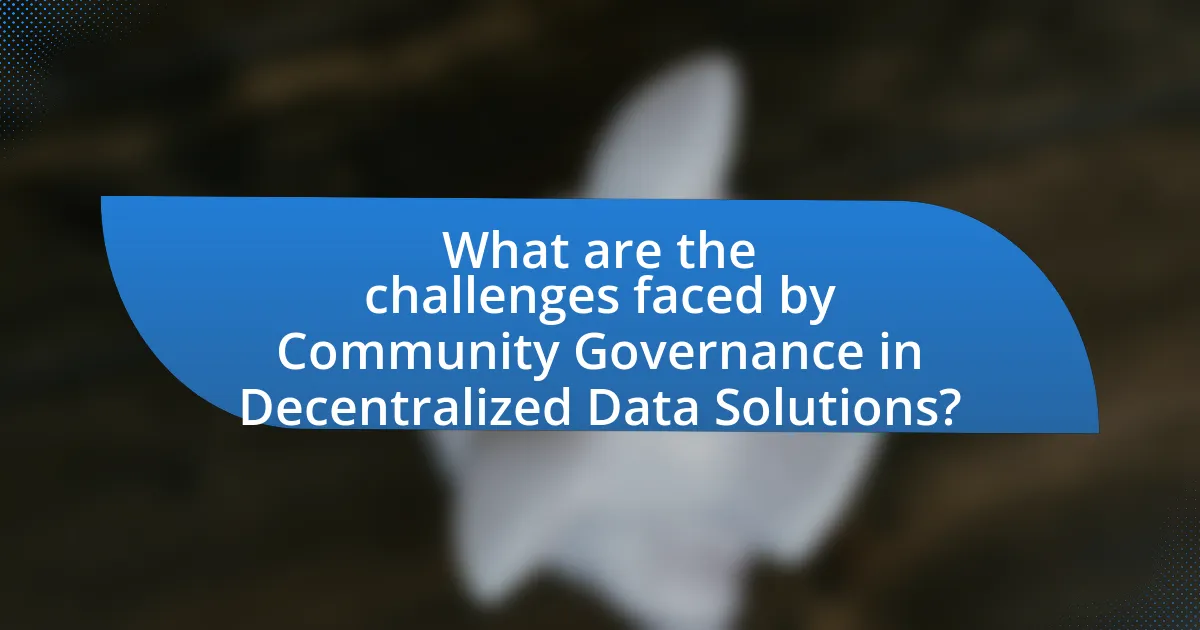
What are the challenges faced by Community Governance in Decentralized Data Solutions?
Community governance in decentralized data solutions faces several challenges, including decision-making inefficiencies, lack of clear accountability, and potential conflicts of interest among participants. Decision-making inefficiencies arise due to the need for consensus among diverse stakeholders, which can slow down the process and hinder timely responses to issues. Lack of clear accountability can lead to ambiguity regarding who is responsible for governance actions, making it difficult to enforce rules or address grievances. Additionally, potential conflicts of interest may emerge when participants prioritize personal or organizational goals over the collective good, undermining the integrity of the governance process. These challenges can significantly impact the effectiveness and sustainability of community governance in decentralized data solutions.
What obstacles hinder effective Community Governance?
Obstacles that hinder effective Community Governance include lack of participation, insufficient resources, and conflicting interests among community members. Lack of participation can lead to decisions that do not reflect the community’s needs, as evidenced by studies showing that communities with low engagement often struggle to implement effective governance structures. Insufficient resources, such as funding and technical support, can limit the ability of communities to organize and execute governance initiatives, which is highlighted by research indicating that resource constraints are a common barrier in decentralized governance models. Conflicting interests among members can create divisions and hinder consensus-building, as demonstrated in various community governance case studies where differing priorities led to gridlock in decision-making processes.
How do conflicts of interest impact Community Governance?
Conflicts of interest significantly undermine Community Governance by eroding trust and transparency among stakeholders. When individuals or organizations prioritize personal gain over community welfare, decision-making becomes biased, leading to policies that may not reflect the collective interests of the community. For instance, a study by the National Academy of Sciences highlights that conflicts of interest can lead to reduced participation in governance processes, as community members may feel their voices are marginalized. This diminished engagement can result in ineffective governance structures and a lack of accountability, ultimately harming the community’s ability to achieve its goals in decentralized data solutions.
What are the implications of low community participation?
Low community participation leads to weakened governance and reduced effectiveness in decentralized data solutions. When community members are disengaged, decision-making processes lack diverse perspectives, resulting in policies that may not address the actual needs of the community. Research indicates that high levels of community engagement correlate with better project outcomes; for instance, a study by the National Civic League found that communities with active participation saw a 20% increase in project success rates. Additionally, low participation can foster mistrust and apathy, undermining the legitimacy of governance structures and potentially leading to conflicts or failures in implementation.
How can these challenges be addressed?
Community governance in decentralized data solutions can address challenges by implementing transparent decision-making processes and fostering active participation among stakeholders. By establishing clear protocols for governance, communities can ensure that all voices are heard, which enhances trust and accountability. Research indicates that decentralized governance models, such as those used in blockchain technology, promote inclusivity and reduce the risk of centralization, which can lead to data misuse. For instance, the Ethereum network employs a decentralized autonomous organization (DAO) structure that allows community members to vote on proposals, thereby directly influencing the direction of the project. This participatory approach not only mitigates challenges related to governance but also empowers users, leading to more resilient and adaptive data solutions.
What strategies can improve community engagement?
To improve community engagement, organizations should implement strategies such as fostering open communication, creating inclusive platforms for participation, and utilizing feedback mechanisms. Open communication encourages transparency and trust, which are essential for active participation. Inclusive platforms, such as community forums or social media groups, allow diverse voices to be heard, enhancing the sense of belonging. Feedback mechanisms, like surveys or suggestion boxes, enable community members to express their opinions and influence decision-making, thereby increasing their investment in community initiatives. Research indicates that communities with high engagement levels often see improved outcomes, such as increased satisfaction and collaboration, as evidenced by studies conducted by the National Civic League, which highlight the correlation between engagement strategies and community resilience.
How can transparency be enhanced in governance processes?
Transparency in governance processes can be enhanced through the implementation of open data initiatives, which allow citizens access to government information. By making data publicly available, stakeholders can scrutinize decisions, track resource allocation, and hold officials accountable. For instance, the Open Government Partnership, which includes over 75 countries, promotes transparency by encouraging governments to publish data on budgets, contracts, and performance metrics, thereby fostering trust and civic engagement.
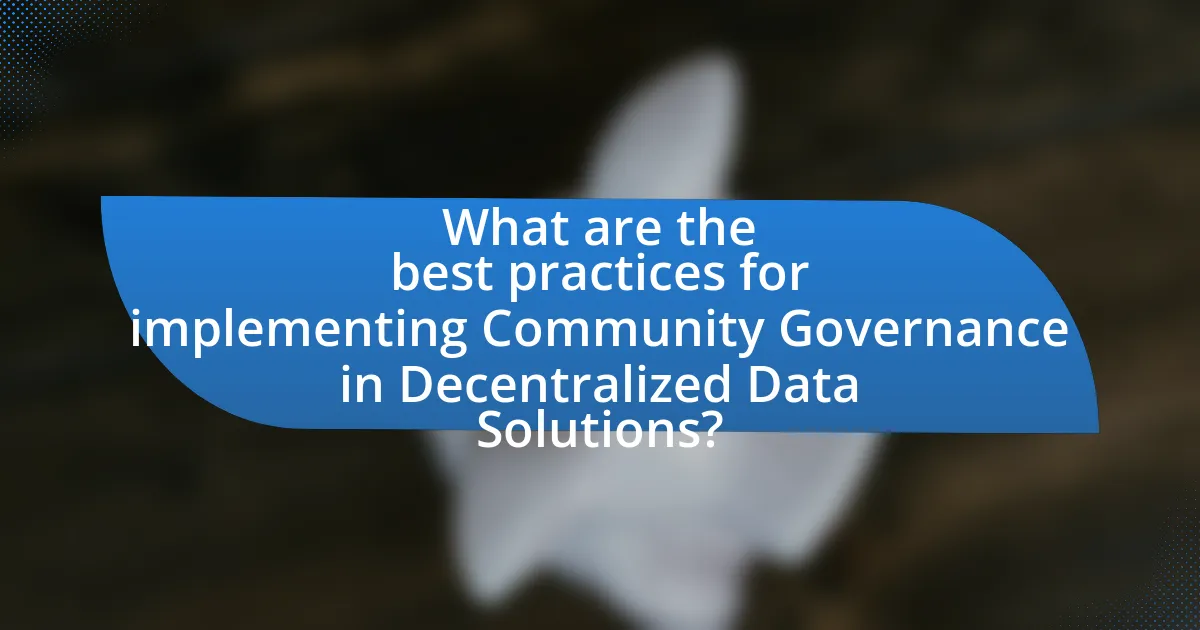
What are the best practices for implementing Community Governance in Decentralized Data Solutions?
The best practices for implementing Community Governance in Decentralized Data Solutions include establishing clear governance frameworks, promoting active community participation, and ensuring transparency in decision-making processes. Clear governance frameworks define roles, responsibilities, and processes, which help in managing community expectations and maintaining order. Active community participation encourages diverse input and fosters a sense of ownership among members, leading to more robust solutions. Transparency in decision-making builds trust and accountability, as community members can see how decisions are made and can hold leaders accountable. These practices are supported by successful decentralized projects like Ethereum, which emphasizes community involvement and transparent governance structures, demonstrating their effectiveness in fostering sustainable and engaged communities.
What frameworks support effective Community Governance?
Effective Community Governance is supported by frameworks such as the Decentralized Autonomous Organization (DAO) model, which utilizes smart contracts to automate decision-making processes, ensuring transparency and accountability. Additionally, the Holacracy framework promotes distributed authority and self-management within organizations, allowing community members to take ownership of their roles and responsibilities. Research indicates that these frameworks enhance participation and trust among community members, leading to more resilient governance structures. For instance, a study by the MIT Media Lab highlights how DAOs can facilitate collective decision-making in decentralized environments, reinforcing the effectiveness of these governance frameworks.
How can technology facilitate better governance practices?
Technology can facilitate better governance practices by enhancing transparency, improving communication, and enabling data-driven decision-making. For instance, blockchain technology provides an immutable record of transactions, which increases accountability and reduces corruption in governance processes. Additionally, digital platforms allow for real-time communication between government entities and citizens, fostering greater public engagement and feedback. According to a study by the World Bank, countries that implement e-governance initiatives see a significant increase in citizen satisfaction and trust in government, demonstrating the effectiveness of technology in improving governance practices.
What role do community guidelines play in governance?
Community guidelines serve as foundational frameworks that establish acceptable behavior and norms within a governance structure. They facilitate order, promote accountability, and ensure that all members understand their rights and responsibilities, which is crucial in decentralized data solutions. For instance, platforms like Reddit and Wikipedia utilize community guidelines to maintain user engagement and content quality, demonstrating that clear rules can lead to a more collaborative and respectful environment. This structured approach helps mitigate conflicts and fosters a sense of community ownership, ultimately enhancing the effectiveness of governance in decentralized systems.
What are the key metrics for evaluating Community Governance success?
Key metrics for evaluating Community Governance success include participation rates, decision-making efficiency, and stakeholder satisfaction. Participation rates measure the level of engagement within the community, often indicated by the number of active members or contributions to discussions and votes. Decision-making efficiency assesses how quickly and effectively decisions are made, which can be quantified by the time taken to reach consensus or implement changes. Stakeholder satisfaction gauges the community’s perception of governance effectiveness, typically measured through surveys or feedback mechanisms. These metrics provide a comprehensive view of governance performance, ensuring that community needs are met and fostering a collaborative environment.
How can community feedback be effectively gathered and utilized?
Community feedback can be effectively gathered and utilized through structured surveys, focus groups, and digital platforms that encourage open dialogue. These methods allow organizations to collect diverse perspectives and insights from community members, ensuring that feedback is representative and actionable. For instance, a study by the International Association for Public Participation found that structured engagement processes can increase community trust and participation by up to 40%. Utilizing this feedback involves analyzing the data to identify trends and implementing changes based on community input, which fosters a sense of ownership and enhances the effectiveness of decentralized data solutions.
What indicators reflect the health of Community Governance?
Indicators that reflect the health of Community Governance include participation rates, decision-making transparency, and community satisfaction levels. High participation rates indicate active engagement among community members, which is essential for effective governance. Decision-making transparency ensures that processes are open and accountable, fostering trust within the community. Community satisfaction levels, often measured through surveys, provide insight into how well governance structures meet the needs and expectations of members. These indicators collectively demonstrate the effectiveness and responsiveness of governance in a decentralized context.
What practical steps can organizations take to enhance Community Governance?
Organizations can enhance Community Governance by implementing transparent decision-making processes, fostering active participation, and establishing clear communication channels. Transparent decision-making allows community members to understand how decisions are made, which builds trust and accountability. Encouraging active participation through regular meetings, surveys, and feedback mechanisms ensures that diverse voices are heard and considered in governance. Establishing clear communication channels, such as forums or newsletters, facilitates ongoing dialogue and keeps the community informed about developments and opportunities for involvement. These steps are supported by research indicating that communities with high levels of transparency and participation experience greater satisfaction and engagement, ultimately leading to more effective governance outcomes.
